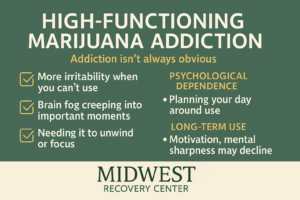Even when you’re meeting deadlines, keeping relationships intact, and showing up for life, marijuana use can become a quiet constant you don’t question—until you do.
Maybe you’ve told yourself, “It’s just weed, it’s not addictive.” It’s a common belief, especially when your life still looks “together” from the outside. But lately, you’ve noticed something: days without it feel harder. Your mind feels restless, your sleep is off, and the hours without using seem to stretch uncomfortably long.
That’s the point where the question shifts from Is this addiction? to Would my life feel better without depending on this?
Marijuana addiction treatment isn’t just for people who’ve lost everything. It’s for people—often high-functioning, often private—who are ready to reclaim time, clarity, and energy from something that’s quietly taken more space than they intended.
Addiction Isn’t Always Obvious
The picture of addiction many people hold—the lost job, the broken relationships, the chaos—isn’t the only truth.
Addiction can also live quietly in someone who works long hours, hits the gym, makes dinner for their kids, and pays every bill on time. In these cases, it’s the internal costs that pile up.
High-functioning people often overlook the signs because life “still works.” But under the surface, you may notice:
- More irritability when you can’t use
- Brain fog creeping into important moments
- Needing it to unwind or focus
- The creeping anxiety of “running out”
Treatment offers a space to explore these patterns without judgment or pressure. It’s not about proving you have a problem—it’s about finding out if you want something better.
Dependence Can Be More Than Physical
Marijuana’s physical withdrawal symptoms are often described as mild. But psychological dependence is another story.
When you find yourself:
- Planning your day around use
- Avoiding activities where you can’t use
- Feeling anxious, restless, or unfocused without it
…that’s dependence. And it’s often harder to shake than people expect.
Treatment addresses the mental and emotional pull marijuana can have. Instead of replacing one habit with another, you learn sustainable ways to relax, focus, and cope. That means tools you can use on tough days and good days, so you’re not defaulting to the same pattern every time life gets stressful.

The Hidden Costs of Long-Term Use
Over time, heavy marijuana use can quietly erode things you value—motivation, mental sharpness, emotional resilience.
You might notice:
- Projects you’ve been “meaning to start” for months
- More difficulty remembering small details
- A growing sense of detachment or flatness
These shifts happen slowly, which makes them easy to ignore. But they add up.
Getting help sooner means you can address these changes before they become a permanent part of your baseline. Marijuana addiction treatment in Perrysburg, Ohio offers a reset—space to clear your head, check in with yourself, and decide what you really want your life to feel like.
Treatment Isn’t About Labels
One of the biggest misconceptions about addiction treatment is that you have to hit a certain threshold—rock bottom, a failed relationship, an official diagnosis—before you “qualify.”
The truth? You don’t have to call yourself “an addict” to benefit from treatment. You just have to want a change.
Many clients at Midwest Recovery come in saying things like:
“I just want to feel like myself again.”
“I want to know if I can handle life without it.”
Treatment becomes a space to experiment with living differently. No pressure to declare anything forever—just a chance to see if your mind, mood, and energy improve when marijuana isn’t in the driver’s seat.
Why Professional Support Helps
If you’ve tried to cut back or quit on your own, you already know how tricky it can be. Habits have a way of pulling us back in—especially the ones tied to stress relief, focus, or comfort.
In a structured treatment program, you’re not relying on willpower alone. You have:
- Therapy to address the reasons you use in the first place
- Peer support to remind you you’re not the only one making this choice
- Accountability that makes it harder to slip back unnoticed
- Coping strategies that actually work in real life
This kind of structure takes the pressure off you to “figure it out” alone—and gives you tools you can use long after treatment ends.
It’s About Quality of Life, Not Just Quitting
For high-functioning people, the decision to get help often isn’t about avoiding disaster—it’s about making life better.
- Less brain fog in the mornings
- More motivation for projects that matter to you
- Greater presence with family and friends
- The quiet confidence of knowing you don’t need a substance to get through the day
Treatment isn’t just about removing marijuana. It’s about adding back the energy, clarity, and peace that might have been missing for a while.
When to Consider Treatment
You might benefit from marijuana addiction treatment if:
- You’ve tried to cut back and struggled
- You notice more irritability, brain fog, or lack of focus without it
- You avoid situations where you can’t use
- You’ve started relying on it to handle stress, boredom, or emotions
These aren’t signs of weakness—they’re signals that something in your relationship with marijuana might be worth examining.
Local Support Matters
Choosing a program close to home means you can stay connected to your support network while getting professional help. Midwest Recovery Center offers marijuana addiction treatment in Toledo, with nearby access for communities like Maumee and Oregon, Ohio.
Being close to home also means you can begin integrating new habits into your daily life right away—building a sustainable recovery that fits your real-world routines.
FAQs About Marijuana Addiction Treatment
Is marijuana really addictive?
While marijuana may not create the same severe physical withdrawal as some other substances, it can still lead to dependence—especially psychological dependence. Many people find themselves using more often than they planned and feeling uneasy without it.
What happens during marijuana addiction treatment?
Treatment often includes individual counseling, group therapy, and skill-building to manage cravings and stress. The goal is not only to reduce or stop use but also to improve overall quality of life.
Do I have to quit forever?
Not necessarily. Some people enter treatment to experiment with cutting back, while others choose complete abstinence. A good program meets you where you are and helps you decide what works best for you.
Can I still work while in treatment?
Yes. Many programs offer flexible scheduling, including evening or outpatient sessions, so you can continue working while getting support.
Will people find out I’m in treatment?
Treatment is confidential. Your privacy is protected, and you control who knows about your participation.
Call (888) 657-0858 or visit Midwest Recovery Center’s marijuana addiction treatment program in Toledo, Ohio to learn more about our marijuana addiction treatment services.








